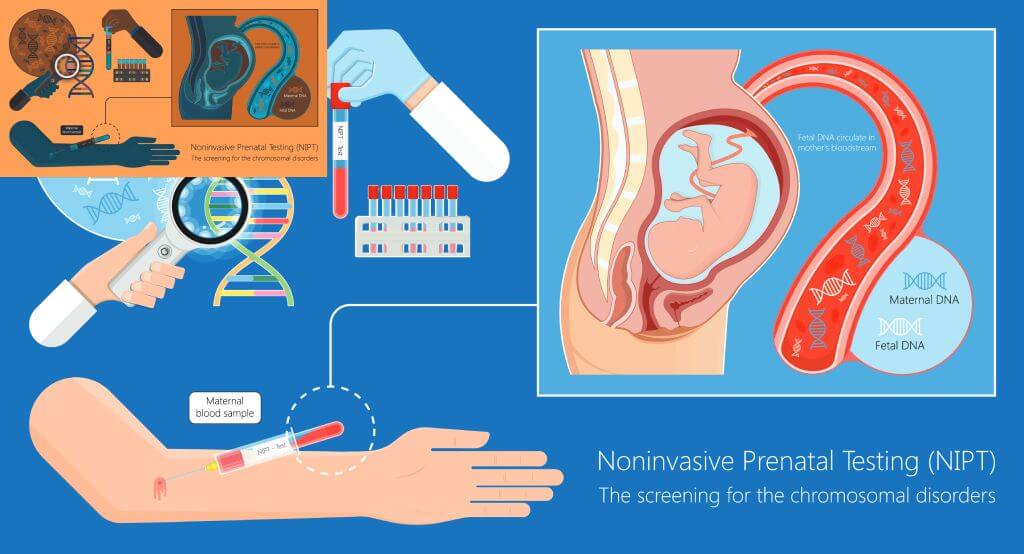NIPT is a safe and highly accurate screening method that analyzes fetal cell-free DNA circulating in the mother’s bloodstream. It’s used to assess the baby’s risk for common chromosomal conditions like Down syndrome (Trisomy 21), Edwards syndrome (Trisomy 18), Patau syndrome (Trisomy 13), and sex chromosome abnormalities.
But timing is everything, especially when it comes to test accuracy, result clarity, and decision-making during pregnancy.
In this guide, we explain the ideal time to take the NIPT test, the science behind it, and what to expect depending on your stage of pregnancy.
When Is the Best Time to Take the NIPT Test?
You can take the NIPT test from 10 weeks of pregnancy onwards.
This is the earliest recommended time because fetal DNA, also called fetal fraction, becomes measurable and reliable in the mother’s blood by the 10th gestational week. Taking the test earlier may result in insufficient fetal DNA, which can lead to inconclusive results or a repeat test.
NIPT Test Timing Overview
| Week of Pregnancy | Can You Take NIPT? | Notes |
|---|---|---|
| Before 10 weeks | Not recommended | Fetal DNA may be too low (low fetal fraction) |
| 10–13 weeks | Ideal window | Early detection; can be paired with NT scan or Double Marker |
| 14–20 weeks | Still effective | For women who missed early screening or want additional reassurance |
| After 20 weeks | Possible | Less valuable for early decisions, but still provides genetic insight |
Why Does Timing Matter in NIPT?
1. Maximizing Accuracy
The test’s accuracy is highly dependent on the amount of fetal DNA present in the maternal blood sample. Taking the NIPT after 10 weeks ensures there is enough fetal DNA to detect or rule out chromosomal abnormalities with high precision.
2. More Time for Decisions
Early screening gives parents time to:
- Opt for genetic counseling
- Undergo confirmatory diagnostic tests (like amniocentesis or CVS) if needed
- Make informed medical or personal decisions
3. Peace of Mind Sooner
Knowing your baby’s risk early can reduce anxiety and allow for early intervention and better care planning, especially in high-risk pregnancies.
Can You Take the NIPT Test Later in Pregnancy?
Yes. If you’ve missed the initial screening window or have concerning results from another test (like the double marker, quad marker, or ultrasound), NIPT can still be done in the second trimester or later.
Situations where later NIPT testing is helpful:
- Late antenatal booking
- Abnormal ultrasound findings
- Inconclusive earlier screenings
- High-risk factors identified mid-pregnancy
However, the clinical value is highest when the test is done between 10 and 13 weeks.
What Should You Do Before Taking the NIPT Test?
Here are a few steps to ensure your NIPT goes smoothly:
- Confirm your gestational age via an early ultrasound (especially to confirm you are past 10 weeks).
- No fasting is required before the blood draw.
- Discuss with your OB-GYN or genetic counselor to determine whether NIPT is right for you.
- Choose a reliable and accredited lab for sample collection and analysis.
What Conditions Does NIPT Screen For?
Standard NIPT panels typically screen for:
- Trisomy 21 (Down syndrome)
- Trisomy 18 (Edwards syndrome)
- Trisomy 13 (Patau syndrome)
- Sex chromosome anomalies (e.g., Turner syndrome, Klinefelter syndrome)
Advanced NIPT panels may include:
- Microdeletions (e.g., DiGeorge syndrome)
- Single-gene disorders (depending on the platform)
While NIPT is a screening test, not a diagnostic one, it offers up to 99% accuracy for common trisomies with zero risk to the fetus.
Why Trust NM Medical for Your NIPT Test?
While this blog focuses on the science and timing, choosing the right provider for your NIPT is just as crucial.
NM Medical offers comprehensive, hassle-free prenatal screening with:
- NABL-accredited centers and access to India’s best NIPT testing platforms
- Trained phlebotomists for home sample collection in Mumbai, Pune, Bangalore, and Nashik
- Experienced genetic counselors for pre-test and post-test support
- Timely and transparent results, typically within 7–10 working days
- Assistance with next steps if a result is flagged
Ready to Take the Next Step?
Whether you are just crossing the 10-week mark or entering your second trimester, NIPT can give you early insight into your baby’s health, accurately and non-invasively.
Take control of your prenatal journey with confidence.


